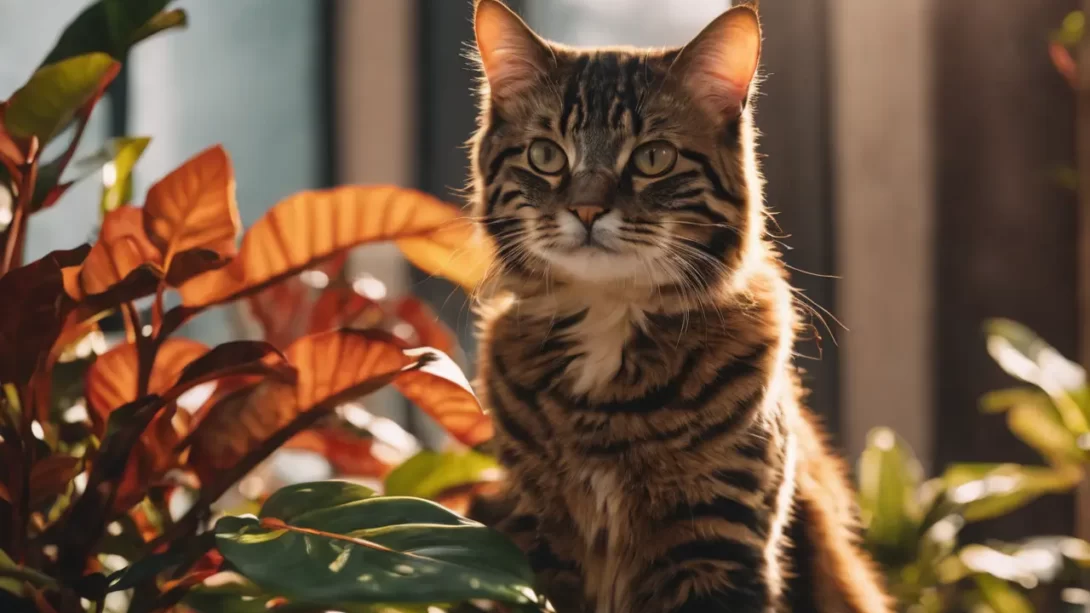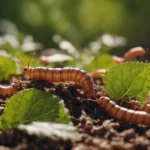The croton plant (Codiaeum variegatum), known for its striking, multicolored foliage, is a popular choice among houseplant enthusiasts. These vibrant plants add a splash of color to any indoor space. However, cat owners often face the challenge of balancing their love for plants with the safety of their feline companions. This article explores a crucial question for cat owners: Are croton plants toxic to cats?
Croton Plants
Croton plants are distinctive for their glossy, leathery leaves that come in a variety of colors, including red, yellow, green, and purple. These tropical plants are native to Southeast Asia and the Pacific Islands but have become a common indoor plant in many parts of the world. Crotons are sought after for their unique, variegated leaves and their ability to brighten up indoor spaces. They come in a range of shapes and sizes, making them versatile for different home decor styles. However, their potential toxicity to cats is a concern that needs to be addressed.
Toxicity in Houseplants
Many houseplants, while aesthetically pleasing, can pose a risk to pets, particularly cats, who are known to nibble on leaves. Plants can be toxic to cats due to various natural chemicals they contain, which can cause a range of health issues if ingested. Cats, due to their curious nature, often come into contact with houseplants, leading to the risk of ingestion or skin contact. Understanding the toxicity of plants is crucial for cat owners to ensure the safety and well-being of their pets.
Croton Plants and Their Toxicity to Cats
Croton plants are indeed toxic to cats. They contain certain compounds that can cause irritation and discomfort when ingested or touched. These compounds are a natural defense mechanism of the plant, deterring herbivores from eating them. In the case of cats, the ingestion of croton plant leaves or stems can lead to various symptoms of distress. It’s important for cat owners to recognize that while croton plants are beautiful, they can pose a risk to their feline pets.
Symptoms of Croton Plant Poisoning in Cats
The symptoms of croton plant poisoning in cats can vary depending on the level of exposure. If a cat ingests part of a croton plant, it may experience gastrointestinal upset, which can manifest as vomiting or diarrhea. In some cases, cats might drool excessively or paw at their mouths due to irritation. Contact with the skin can cause dermatitis, leading to redness, itching, or swelling. It is essential for cat owners to be aware of these symptoms and to monitor their pets closely if they have croton plants at home. Early detection of these symptoms is crucial for prompt and effective treatment.
Immediate Steps and Veterinary Care
If you suspect your cat has ingested or come into contact with a croton plant, immediate action is necessary. Firstly, remove any plant material from your cat’s mouth and gently rinse their mouth with water. Avoid inducing vomiting unless instructed by a veterinarian. If skin contact has occurred, wash the affected area with mild soap and water. It’s crucial to contact your veterinarian or an emergency animal clinic as soon as possible. Provide them with information about the incident, including the amount of plant ingested and the symptoms your cat is exhibiting. The veterinarian may administer treatments such as activated charcoal, IV fluids, or medications to alleviate symptoms and prevent further absorption of toxins. Early veterinary intervention can significantly improve the outcome for your cat.
Preventing Cat Exposure to Croton Plants
To ensure the safety of your feline friend, it’s wise to take preventive measures. If you own croton plants, consider placing them in areas inaccessible to your cat, such as high shelves or closed rooms. Always supervise your cat if they show interest in your houseplants. Alternatively, cat owners may opt for cat-friendly plants that pose no risk to their pets. For those who still wish to keep croton plants, providing your cat with safe, appealing alternatives, like cat grass or catnip, can distract them from harmful plants.
Safe Plant Alternatives for Cat Owners
For those seeking alternatives to croton plants, there are many safe and attractive options. Spider plants, Boston ferns, and African violets are popular choices that pose no threat to cats. These plants can provide the same aesthetic appeal without the risks associated with croton plants. By choosing these safer alternatives, cat owners can enjoy the benefits of houseplants without compromising the health and safety of their pets.
Conclusion
While croton plants add a burst of color and life to indoor spaces, their toxicity to cats cannot be overlooked. The safety of our feline companions should always be a priority. By understanding the risks, recognizing the symptoms of poisoning, and taking appropriate preventive measures, cat owners can create a harmonious and safe environment for their pets. Remember, when in doubt about the safety of a particular plant, consult with a veterinarian or a plant expert. This careful approach ensures that both your plants and your pets can thrive together safely.



